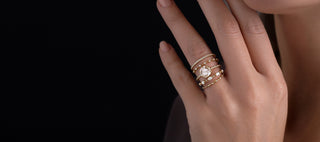
Exploring the Wonders of Moissanite
A COMPREHENSIVE EDUCATIONAL GUIDE
A More Eco-Friendly Choice
Lab-created moissanite offers an environmentally friendly alternative to mined gemstones. By being produced in a controlled laboratory setting, moissanite avoids the negative environmental impacts and ethical issues associated with traditional gemstone mining. With a significantly smaller carbon footprint compared to diamonds or other gemstones, moissanite stands out as a more responsible and sustainable option.
•‧•┈┈┈┈୨୧┈┈┈┈•‧•
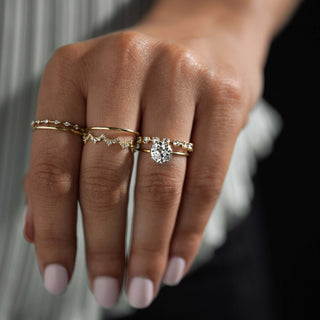
What is Moissanite?
gemstone called moissanite is made from stars. Henri Moissan, a French chemist who later won the Nobel Prize in Chemistry, made the discovery in 1893. In Arizona, he found tiny fragments of the diamond that would eventually bear his name in a crater left by a meteorite that had plummeted to Earth. Before realizing that the crystals were actually silicon carbide, he thought he had found diamonds.
The majority of moissanite available today is synthetic because real moissanite is incredibly uncommon. One of the most brilliant jewels in the world was created by successfully synthesizing Moissan's particles after many years of trial and error. Often referred to as a "diamond simulant," moissanite is made to resemble a real diamond both chemically and optically, but it is not the same. There is a noticeable difference in the two jewels' hue, durability, and brilliance. Moissanites and diamonds both transfer heat very well. write in different wording
Benefits of Moissanite
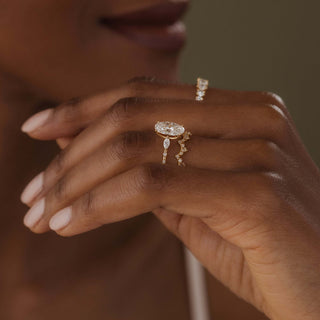
Is Moissanite a Diamond?
Moissanite and diamonds are distinct from each other, though they may appear similar at first glance. Moissanites are lab-cultivated and composed of silicon carbide, whereas diamonds are naturally occurring and made of carbon.
One notable difference is moissanite's higher refractive index, which creates more rainbow-like "fire" when light strikes its surface, compared to a diamond. While diamonds are harder, with a Mohs hardness of 10, moissanites have a slightly lower hardness of 9.25.
Despite both gemstones exhibiting dispersion, scintillation, and excellent thermal conductivity, their compositions and physical properties set them apart.
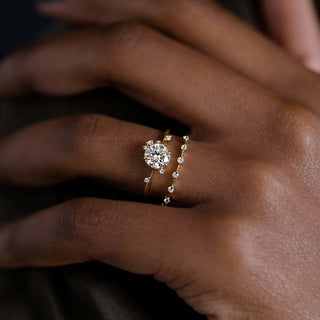
How to Tell a Moissanite from a Diamond?
It can be challenging to distinguish between moissanite and diamond if you are not trained in this area.
The best method to determine the difference is to examine two gemstones of comparable sizes—a moissanite and a diamond—side by side. A diamond's characteristic glitter results from a special fusion of scintillation, reflected light, and colors that refract through it. In addition to showing scintillation, color refraction, and light reflection, moissanite has more than twice as much "fire" (i.e., more powerful rainbow light flashes) as diamonds. The most effective method for rapidly differentiating moissanite from diamond is the 'disco ball' effect, which is more pronounced in moissanite with higher carat weights.
Take it to a qualified professional to get an official confirmation of the distinction between a moissanite and a diamond. They can confirm if your stone is a moissanite or a diamond by using a loupe to look at the "doubling" of opposing facet junctions.
Comparison Guide
MOISSANITE VS. DIAMOND
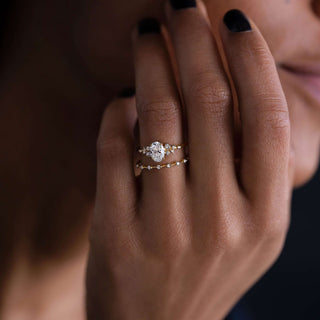
Tips on Selecting a Moissanite
While purchasing moissanite is similar to buying any other gemstone, there are some specific considerations to keep in mind. Unlike diamonds, which are graded on carat, cut, color, and clarity by independent organizations, moissanites are assessed based only on cut, color, and clarity. At Brilliant Earth, they are then classified by color into Premium or Super Premium categories. Super Premium moissanites have a color range of D–E–F, while Premium moissanites are comparable to G–H color diamonds. Thanks to advanced manufacturing techniques, the quality of moissanites is remarkably consistent.
The key consideration is whether moissanite is the right gemstone for you. Reflect on how it differs from diamonds in terms of fire, scintillation, cost, and durability before making your decision. This will help you determine if moissanite meets your preferences and expectations.
Moissanite FAQ's
IF YOU HAVE MORE QUESTIONS THAT WE DO NOT COVER BELOW THEN:

